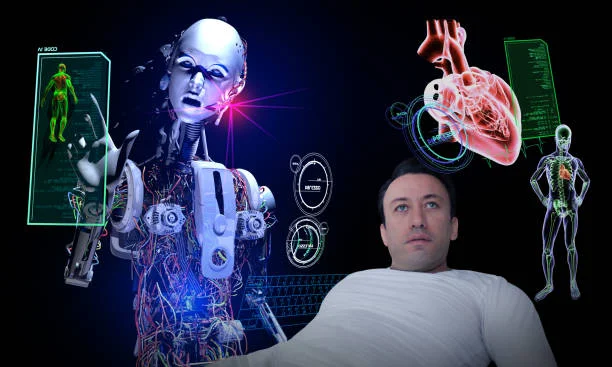The Dawn of Predictive AI
In the realm of artificial intelligence, the boundaries of what technology can achieve are continually expanding. Recently, a groundbreaking AI system has emerged that takes predictive analytics to a whole new level. This innovative AI not only forecasts various aspects of your life but also astonishingly predicts your death. This dual capability has sparked a mixture of intrigue and apprehension, raising profound questions about the future of AI and its impact on human existence.
The Mechanics of Predictive AI
Data Collection and Integration
The AI's accuracy hinges on the diversity and comprehensiveness of the data it processes. Sources include:
- Medical Records: Detailed health histories provide insights into potential future health issues.
- Genetic Information: DNA analysis helps predict genetic predispositions to certain diseases.
- Lifestyle Data: Information on diet, exercise, and habits contributes to understanding long-term health impacts.
- Social Media Activity: Online behavior and interactions offer additional context about mental and emotional well-being.
Machine Learning Algorithms
The system employs advanced machine learning algorithms that continuously learn and improve from the data. Key techniques include:
- Supervised Learning: Uses labeled data to train the AI, improving its predictive accuracy over time.
- Unsupervised Learning: Identifies patterns and correlations in unlabeled data, uncovering insights that might not be immediately obvious.
- Deep Learning: Utilizes neural networks to mimic human brain function, allowing the AI to make complex predictions.
Predicting Life Events
The AI's capabilities extend beyond mere health predictions. It can forecast major life events with remarkable precision. These predictions include:
- Career Trajectories: Analyzing professional achievements and potential future opportunities.
- Personal Milestones: Predicting significant events like marriage, childbirth, or relocation.
- Financial Outlook: Forecasting economic stability and investment success based on spending habits and market trends.
The Controversial Aspect: Predicting Death
While predicting life events is impressive, the AI's ability to forecast an individual's death has garnered the most attention. This capability is achieved through:
- Health Risk Assessment: Evaluating medical data to predict the likelihood of fatal conditions such as heart disease or cancer.
- Lifestyle Risk Factors: Analyzing habits like smoking, alcohol consumption, and diet to determine their impact on longevity.
- Environmental Factors: Considering the impact of one's living environment on health outcomes.
Accuracy and Ethical Considerations
The AI boasts a 78% accuracy rate in predicting death, a figure that raises significant ethical questions. The potential benefits are clear—early intervention and personalized healthcare could save lives. However, there are also considerable risks, including:
- Privacy Concerns: The extensive data collection required could infringe on individual privacy.
- Psychological Impact: Knowing one's predicted death date could cause significant emotional distress.
- Moral Dilemmas: The use of such predictive technology raises questions about determinism and free will.
Unbelievable things AI can already perform include reading minds and predicting deaths.
Dive into the awe-inspiring realm of Artificial Intelligence, a world where the once-imagined is now startlingly real. Picture a technology that predicts life spans, reads thoughts, and speaks for those without a voice. Envision drones autonomously navigating the skies, reshaping our world.
As we journey through these advancements, we're also faced with profound ethical questions. Can AI enhance human life without infringing on our privacy and autonomy? What happens when machines can interpret our innermost thoughts?
Real-World Applications and Implications
The practical applications of this AI are vast, with implications for various sectors:
Healthcare
In healthcare, predictive AI can revolutionize patient care. Personalized medicine can be tailored to an individual's specific risk factors, allowing for early detection and treatment of diseases. Hospitals and clinics could use AI predictions to prioritize patients based on their health risks, optimizing resource allocation and improving outcomes.
Every protein in the world has a predicted structure and a function, thanks to DeepMind's AI software AlphaFold3.
Insurance Industry
Insurance companies can leverage predictive AI to assess risk more accurately, leading to fairer premiums and more efficient claims processing. However, this also poses the risk of discrimination, as individuals with higher predicted risks might face higher premiums or even denial of coverage.
Public Health Policy
Governments and health organizations can use aggregated data from predictive AI to identify and address public health issues. This could lead to more effective public health campaigns and policies aimed at reducing the prevalence of chronic diseases and improving overall community health.
Challenges and Future Directions
While the potential of predictive AI is immense, several challenges must be addressed to ensure its responsible use:
Data Privacy and Security
Ensuring the security and privacy of the vast amounts of data required is paramount. Robust encryption methods and strict data governance policies are essential to protect individuals' sensitive information.
Bias and Fairness
AI systems can inadvertently perpetuate existing biases present in the data they are trained on. Continuous monitoring and updating of algorithms are necessary to mitigate bias and ensure fairness in predictions.
Regulatory Oversight
Regulatory frameworks must evolve to keep pace with advancements in AI technology. Clear guidelines and regulations are needed to govern the ethical use of predictive AI, ensuring it benefits society without causing harm.
Public Acceptance
For predictive AI to be widely adopted, public trust is crucial. Transparent communication about how the AI works, its benefits, and its limitations can help build public confidence in the technology.
A New Era of AI-Driven Insights
The advent of predictive AI represents a significant milestone in the evolution of technology. By accurately forecasting both life events and death, this AI has the potential to transform healthcare, insurance, and public health. However, its implementation must be handled with care, addressing ethical concerns and ensuring the protection of individual rights.
As we navigate this new frontier, the collaboration between technologists, policymakers, and the public will be essential in harnessing the power of predictive AI for the greater good. The future holds immense possibilities, and with responsible stewardship, predictive AI can indeed enhance our understanding of life and death.












.jpg)




0 Comments